A park bench Approach to diet - your 90%
If you have not read what a park bench approach is, don't fear you are not losing the plot, it is discussed here.
Whole and minimally processed foods. A Park bench approach to effortless weight control.
It is not always a given that processing is necessarily a bad thing for your health - hence the title "minimally processed foods". I have discussed this with some useful examples here.
Whole foods
- Flesh from land and sea animals
- Milk
- Eggs
- Nuts & seeds
- Fruits
- Vegetables
- Potatoes & other tubers
- Legumes (peans, beans, lentils and peanuts...)
Judgement calls / Minimally processed
Here you make a judgement on minimally processed foods to be included in your 90% framework, ask yourself:
1. Does this food in anyway resemble its original whole food product? - Yes? Good to go.
2. Does my body generally react negatively (upset stomach, skin rash, energy levels...) when I consume ________(insert typical allergens: wheat, nut, soy, dairy.....) - No? Good to go.
These foods include:
- Dairy products including cheese and yoghurt
- Whole grain products like bread and cereal
- Refined grain products like white rice
*Supplemental foods such as protein powders can be included within the 90% of your diet. These will be discussed on an individual basis with Luke R. Davies.
Alan Aragon of the lean muscle diet uses the mnemonic 'MEgs FAbulous FIgure STopped MIssing FRies' to recall what constitutes this 90% framework.
- MEat & protein rich foods
- FAt-rich foods
- FIbrous vegetables
- STarchy foods
- Milk and other dairy products
- FRuits
*The caps lock is not a series of typos - the first two letters of each food group are also the first two letters of the mnemonic 'MEgs FAbulous FIgure STopped MIssing FRies'. The list above is also linked to an expanded post on each topic for your perusal.
If you can apply logic and ask the simple question each time you consume something, does X or Y come under 'megs fabulous figure stopped missing fries?' then you can be sure that you will be consuming a nutritious and wholesome diet.
If our diet is somewhere near whole and minimally processed then there is absolutely no reason that we can't enjoy some of those foods not included in our 90%. The follow on article to this discusses what we do have to moderate, but not eliminate; the other 10%.
In order to start the process of learning portion control and eating flexibility I highly recommend you track what you eat for 3-weeks; using My Fitness Pal. To track what you eat you will need to learn how to weigh your foods. I have written a short piece on this with links here. One doesn't need to track forever, it is however a skill that sets you up for a lifetime of effortless weight management, you will eventually be able to eyeball portion sizes which is as accurate as things need to be, this is an inexact science. This will also set you up with all the skills you need should you ever want to get really lean (6 pack lean) and want to go through Luke R. Davies programming, or 'jump on the bus', discussed here.
In a park bench approach we don't specifically programme a calorie target, is it possible to eat too much whole foods? Absolutely, and should you not be losing the weight after applying this 90:10 rule then it possibly becomes a case of too much of a good thing. If you learnt to use My Fitness Pal it is extremely easy to see how many calories you consume on a regular week day and a weekend. Subtle changes can then be made to instil habits that you can stick to; adherence is fundamental to successful weight management.
Closing thoughts
Effortless weight control does not have to involve military like control over eating. It does however reply a little effort initially to make this 90:10 framework a habit for you. We can have a lot of 'indulging foods' that can actually be included in that 90%. Here is a link to support with some effective ways to snack for your 90. The 10% does require some discipline. Such is life.
Also check this short animated video by Dr Mike Evans, a nice overview of what I call the park bench approach to eating.
Lets work out what our 10% will be.
Luke R. Davies :)

